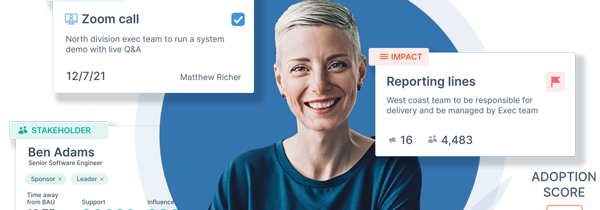Managing Resistance
Is your team equipped to respond effectively?
This module outlines the concept of resistance to change, explains the main reasons individuals resist, distinguishes between resisting attitudes and resisting behaviors, and offers practical techniques to both pre-empt and overcome resistance.
BUY THIS WORKSHOP TRAINING MODULE
INCLUDES
14 page facilitator guide
5 engaging training activities
35 slide presentation deck
05:00 min summary video
8 handouts
7 resources in reading guide
$495.00
has been added to your cart!
have been added to your cart!
30 DAY GUARANTEE
Materials included
Summary Video
DURATION: 05:00 MINS
Explains concepts in a concise, memorable manner. Includes a bulleted summary at the conclusion and matching job-aid handout PDF.
Facilitation Guide
PAGES: 14
Comprehensive yet easy-to-follow instructions for facilitating workshops with the above training activities. Includes useful tips and sample answers to questions. No expertise in the topic area is required.
Presentation Slide Deck
SLIDES: 35
For use during workshops in both PDF & editable PPT formats. Slide numbers for each activity are referenced in the Facilitation Guide.
Reading Guide
RESOURCES LISTED: 7
Useful for participants wishing to deep dive into the module topic with links to the web's best articles, books and tools. PDF format.
Activity Handouts
Everything you need to facilitate successful training activities.
- Commitment to change postcards
- Contingency planning worksheet
- Guess who stakeholder cards
- Information overload flashcards
- Job-aid summary
- Terminology flash cards
- Managing resistance worksheet (What’s not to like)
Tools & Templates
Used during training activities. These can also be used for change implementation.
- Managing resistance worksheet
- Resistance contingency planning matrix template
Benefits
This module will activate your organization to:
- create a common language with which to understand and describe driving emotion states that underpin resistance, such as fear, fatigue, skepticism, disappointment, anxiety and confusion
- empower change management leaders to take action to prevent such resistance occurring or overcome those states if they are recognized among those affected by a change
- create a common language with which to also describe resistance by omission (inaction/bystander)
- show this video to change leaders, managers and supervisors that are encountering resistance to change in order to give them insights into actions they can take towards overcoming the resistance
- explain that simply communicating about a change or change activity may not necessarily lead to message recipients comprehending the message, necessitating the use of a variety of communication types
- This module addresses the reality that there may always be resistance in some form during an organizational change initiative and describes that it may be necessary, in a worst-case scenario, to take action to isolate the damaging impact that a resisting individual can have
This module will empower your teams and individuals to:
- understand that some resistance to change is normal
- identify the varying reasons individuals resist change efforts
- acknowledge that some resistance behavior will be overt and some will be covert
- gain specific techniques for minimizing resistance to change
- distinguish between individuals and their resistance behaviors in order to ensure those individuals do not feel defined by their resistance behaviors
This module is ideal for use at this stage of change implementation:
| Pre-implementation | During Implementation | Post-implementation |
Training Activities
Summary Video & Discussion
TARGET AUDIENCE: All learners SUGGESTED TIMING: 15 - 30 minutes
The module subject-matter is introduced using a short animated video. The knowledge-check and personal reflections questions are then used to explore learners’ understanding and experience before moving on to other connected activities.
Use examples of learners’ experiences in the activities that follow.
Information Overload
TARGET AUDIENCE: All learners SUGGESTED TIMING: 10 minutes
This activity is intended as a brief, fun interlude to make the point that people can only take in a limited amount of information before they start to become confused or unable to absorb the message. The activity uses the ‘Whispers’ game as its basis.
What’s Not to Like?
TARGET AUDIENCE: All learners SUGGESTED TIMING: 30 - 45 minutes
This activity helps learners understand ways of tackling the resistance behavior of individuals. The facilitator leads a brainstorming session looking at ways to tackle example behaviors.
Tackling Resistance Behavior
TARGET AUDIENCE: All learners SUGGESTED TIMING: 20 - 30 minutes
This activity explores in more detail the four reasons people resist change and how these can affect one’s choice of tactics in responding to their resistance.
Using the stakeholder analysis carried out in a previous module, the groups explore how to overcome the resistance of those stakeholders who were not identified on the grid as being favorable towards the change depending on which of the four reasons for resisting is relevant to that group.
The Last Resort
TARGET AUDIENCE: All learners SUGGESTED TIMING: 30 - 45 minutes
This activity deals with damage control when things go wrong. In it, learners explore ways of dealing with particularly damaging forms of resistance such as industrial action, sabotage, political or social campaigns.
Compatibility Guide
This module will boost engagement levels during the following change methodology stages:
| Change Management Methodology | Stage / phase |
| AIM (Accelerated Implementation Methodology) | Develop Target Readiness |
| Kurt Lewin’s Three Stage Change Model | Unfreeze, Change |
| Prosci Enterprise Change Management Model | Implementation |
| Prosci Change Management Levers | Resistance Management lever |
| Beckhard and Harris Change Management Process | Empowering others |
| John Kotter Eight Step Model for Change | Step 7: Never Letting Up |
| ADKAR Model for Change Management | Goal: Ability |
| The Change Leader’s Roadmap model | Phase VII – Implement the Change |
| Kubler Ross Change Curve Model | Anger |
| LaMarsh Change Management Model | Implement the Change |
| People Centered Implementation (PCI) Model | Powerful Engagement Processes |
| Viral Change Roadmap Model | Diffusion |
| General Electric Change Acceleration Process (CAP) | Mobilizing Commitment |
